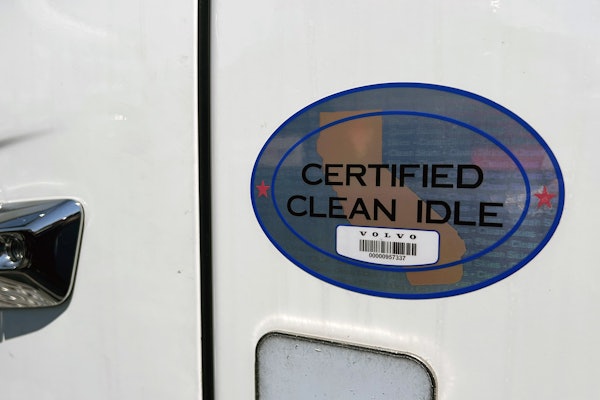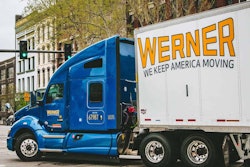When a customer recently called Cross County Cartage with a hot load, company President Harvey Bailey turned immediately to his computer. Using his trailer tracking system from Vistar Datacom, he pinpointed a half-loaded truck just 40 miles from the customer and sent the driver back to Los Angeles in time to make the pickup.
Without the trailer tracking system, the Sharonville, Ohio-based company would have lost the load, Bailey says. Instead, revenue from that one shipment paid for the cost of the tracking unit on that truck.
Bailey’s experience illustrates two of the main reasons carriers invest in trailer tracking systems: more efficient trailer use and improved customer service. Carriers who use trailer tracking technology also say the systems help them pursue new business, improve driver productivity and track lost or stolen trailers.
All systems aren’t the same. Most use the government’s Global Positioning System to obtain tracking data. Some systems use satellites to communicate that data and other messages, while others use cellular communications. Cellular systems can be less expensive to operate than their satellite counterparts, but satellite-based communication generally offers complete coverage. Neither cellular nor satellite communications are immune, however, to natural or artificial obstructions that can interfere with signals.
Another distinction is whether the system provides information independent of the power unit, called an untethered system, or whether it only works when connected to a power unit equipped with mobile communications. Tethered trailer tracking systems are relatively inexpensive add-ons to a mobile communications system, but they can’t provide the location or status of trailers once they are disconnected. Untethered systems, which rely on their own battery power and communications capability, can track trailers at all times.
Improving customer service
No matter which type of system they choose, many carriers cite customer service as the primary reason for investing in trailer tracking.
“When my customer wants me to find out where his trailers are, he’ll call me in the middle of the night,” says John Poreba, an owner of Ursus Transport in Mississauga, Ontario, Canada. “I need to tell him immediately.” That need convinced Poreba to buy the GlobalWave system from Vistar Datacom.
Customer interest also drove Garner Transportation Group’s decision to add trailer tracking, says Sherry Brumbaugh, vice president for management information systems. The Findlay, Ohio-based company began testing trailer tracking last August and installed @Track Communications’ TrackWare system in 25 trailers in December.
In the case of refrigerated carriers, such as Romero Trucking, having a trailer tracking system can give customers peace of mind about temperature-sensitive loads. “Our customers can ask us to verify set points on the temperature, and then if they have some adjustments to make, they can make those,” says Rauls Romero, owner of the Prattville, Ala., company. Romero added trailer tracking to his existing Qualcomm mobile communications systems to keep an eye on potential problems with his 52 refrigerated trailers.
The information trailer tracking provides can also improve your relationship with your customers by reducing the need to pester them. “Coca-Cola and Pepsi Cola don’t want a transportation company calling to see if they’ve got our trailers,” says Bill Faulkner Sr., president of Flash Transport in Fontana, Calif. “It gets irritating after a while.”
Faulkner’s company uses Xtra Lease trailers equipped with Terion’s Fleetview trailer tracking system. Xtra Lease customers can lease or rent trailers equipped with untethered trailer tracking units and track their leased trailers through the Xtra Lease website.
With the system “we don’t have to bother anybody,” Faulkner says. “We can tell if it’s at the dock; we can tell if it’s loaded or unloaded; we can tell if it’s empty, and if it’s empty, we’ll go get it.”
Tracking data sometimes settles disputes between trucking companies and customers and, more positively, establishes a carrier’s quality. Romero, for example, believes the technology gives him an irrefutable edge when a shipper challenges his company’s performance. “Any dispute about temperature can be readily taken care of. It’s a real valuable tool,” he says.
Many trucking companies put trailer tracking information on the Internet so that customers can simply log on to their website to check the status of their loads. Armed with an ID and a password provided by their carrier, shippers can track their shipments without calling the trucking company.
Most tracking units provide reports based on parameters set by the trucking company – every hour, every hour only when moving, or every hour when a certain distance from a landmark. In some cases, customers may want to monitor a shipment more frequently than is possible under normal parameters.
Such additional checks add cost, which may be justified for high value loads. In that case, you have a couple of options: You can change the standard parameters to allow the shipper access to more information on an ongoing basis, or you can simply pay the additional charges incurred. Dedicated carriers with only a couple of customers may want to divide their trailers into different asset pools and post each pool individually on the Internet. This way, dedicated customers can check only those trailers that carry their loads.
Improving fleet efficiency
Beyond enhancing customer service, trailer tracking can also give you bottom line advantages -such as improving operating efficiency and limiting unnecessary equipment purchases. Recent studies show that trucking companies buy or lease three or even four trailers for each of their tractors. Yet, they operate their trailers only an average of three hours a day, so optimizing trailer use could help them reduce the size of their fleet, says Bill Franz, president of Xtra Lease. With improved load planning, many carriers find they don’t need to keep 10, 20 or 30 trailers at one stop to ensure that a trailer will be available when needed.
Carriers that use trailer tracking say it is particularly useful in operations that require many trailer drops. When your trailer-to-tractor ratio is 3 to 1, and you have trailers scattered at warehouses across the country, trailer tracking can ease many headaches.
“We drop a lot of trailers from different warehouses at quite a few places in town,” says Flash Transport’s Faulkner. “Now, when we need to get an empty trailer, we can call them up on the computer screen.”
He contrasts this method of locating empty trailers with the old days of calling around and leaving voice-mail messages. “This way, you don’t have drivers waiting. And it’s expensive having tractors going over to check. You don’t want that with diesel at $1.80 a gallon.”
Many trailer tracking systems use light or sound sensors to determine if trailers are loaded or empty. “The sensor registers which trailers are loaded and which ones are not,” Brumbaugh says. Another common sensor discloses whether the trailer door is open or closed.
Knowing the status of their trailers gives many carriers the flexibility to snag new business. “It happens on a daily basis,” Poreba says. “In the morning, I click on the icon on my computer and find out immediately where the trailers are. It saves me time because calling to find them takes time. Getting on the computer takes one minute.”
An added benefit is the documentation trailer tracking provides. You’ll have a record of how long each trailer is sitting at a customer’s loading dock – information you can use either to prove the need for reduced waiting time or to bill for detention.
Finding lost trailers
Finding an available trailer quickly is important, but some carriers have trouble tracking down all of their trailers, regardless of deadline. Even the most diligent trucking companies occasionally have problems with lost, stolen or misplaced trailers. “It always seems to be that trailers get in their system, and they can’t get them back,” says Xtra Lease’s Franz.
In some cases, drivers may know where trailers are, but dispatchers don’t. Brumbaugh says it’s not uncommon for drivers to hide trailers for use at a future date. “They stick them in the back of the truck stop and then it takes us 50 million phone calls to go find them,” she says.
The ability to find untethered trailers can be critical. “Out of our 350 trailers, at any point in time, 100 could be dropped at somebody else’s yard,” says Terry O’Brien, vice president of logistics for Saddle Creek Corp., a third-party logistics firm in Lakeland, Fla. “Periodically throughout the day, you go in, bring it up on the screen and do a trailer count.” Saddle Creek’s trailers are equipped with Terion tracking units operating on 30 to 60-day batteries.
Theft recovery is another benefit of trailer tracking technology. In many cases, being able to locate the tractor is sufficient. But especially when you haul high-value goods, it’s more important to track the trailer. For example, thieves may have dropped the trailer for unloading later while they try to dispose of the tractor. A theft last November convinced Flash Transport’s Faulkner that trailer tracking might be worth the investment. Today, Flash Transport uses between 25 and 40 similarly equipped trailers just for its overflow business.
Often it’s not intentional theft but the routine misplacement of trailers that prompts a trucking company to look into trailer tracking. That was the case when another carrier used by one of Cross County’s customers accidentally picked up one of its trailers.
They used it for two days before the shipper called to inform Cross County that it hadn’t dropped off an expected trailer.
“I said, ‘Oh, yes, we did,’ and went into the computer,” says Bailey. “It took about three minutes. I went back and told them, ‘It’s on so-and-so’s dock.’ They thought it was amazing that we could find out that quickly.”
Bailey credits the tracking system, which he says can pinpoint a trailer’s location down to a street number, with the successful recovery. “The map comes up, and you can magnify it down to the end of the street,” he says.
Trailer tracking technology serves many functions, from improving driver efficiency, to capturing new business and tracking lost or stolen trailers. But carriers that use the technology say the bottom-line reason for investing in a system is to improve customer service. “It’s good for our customers,” says Faulkner. “In the transportation business, the only thing we really have to offer is service.”







